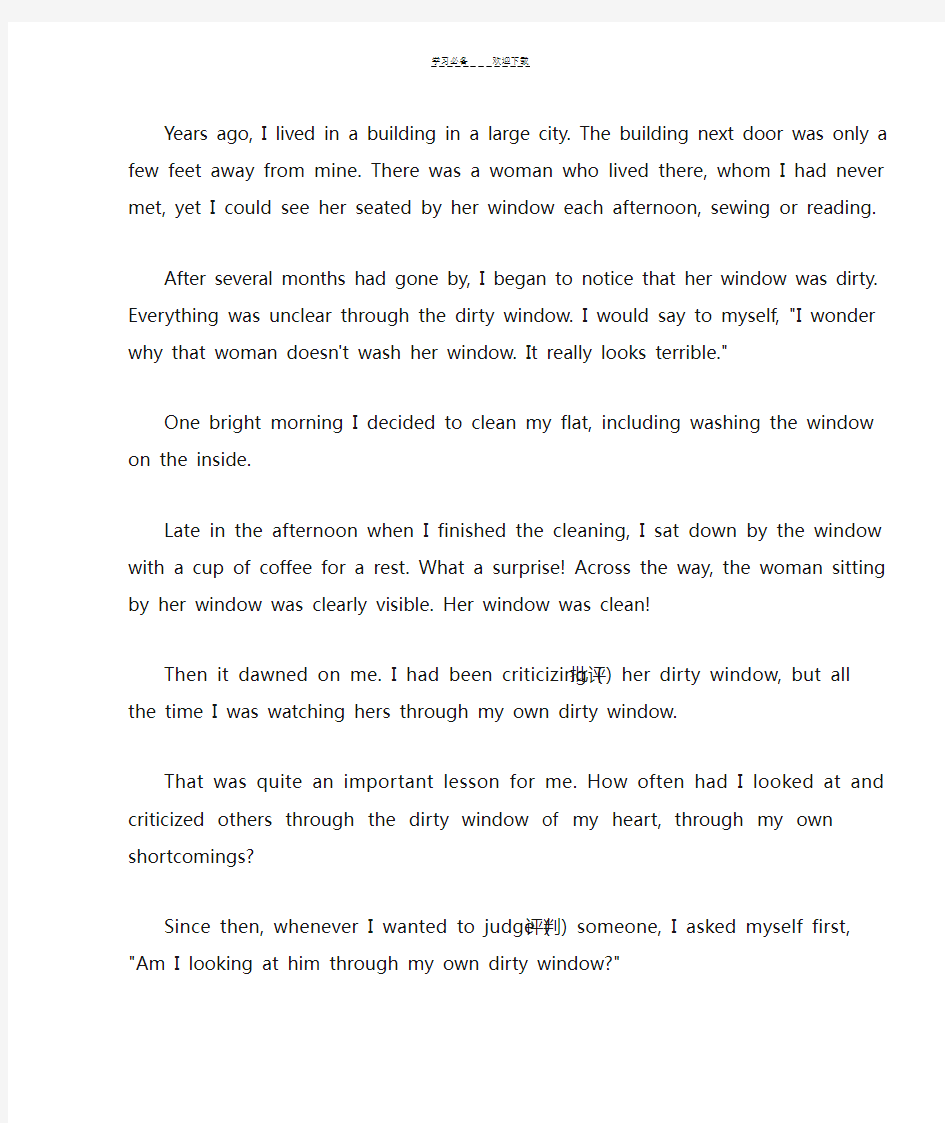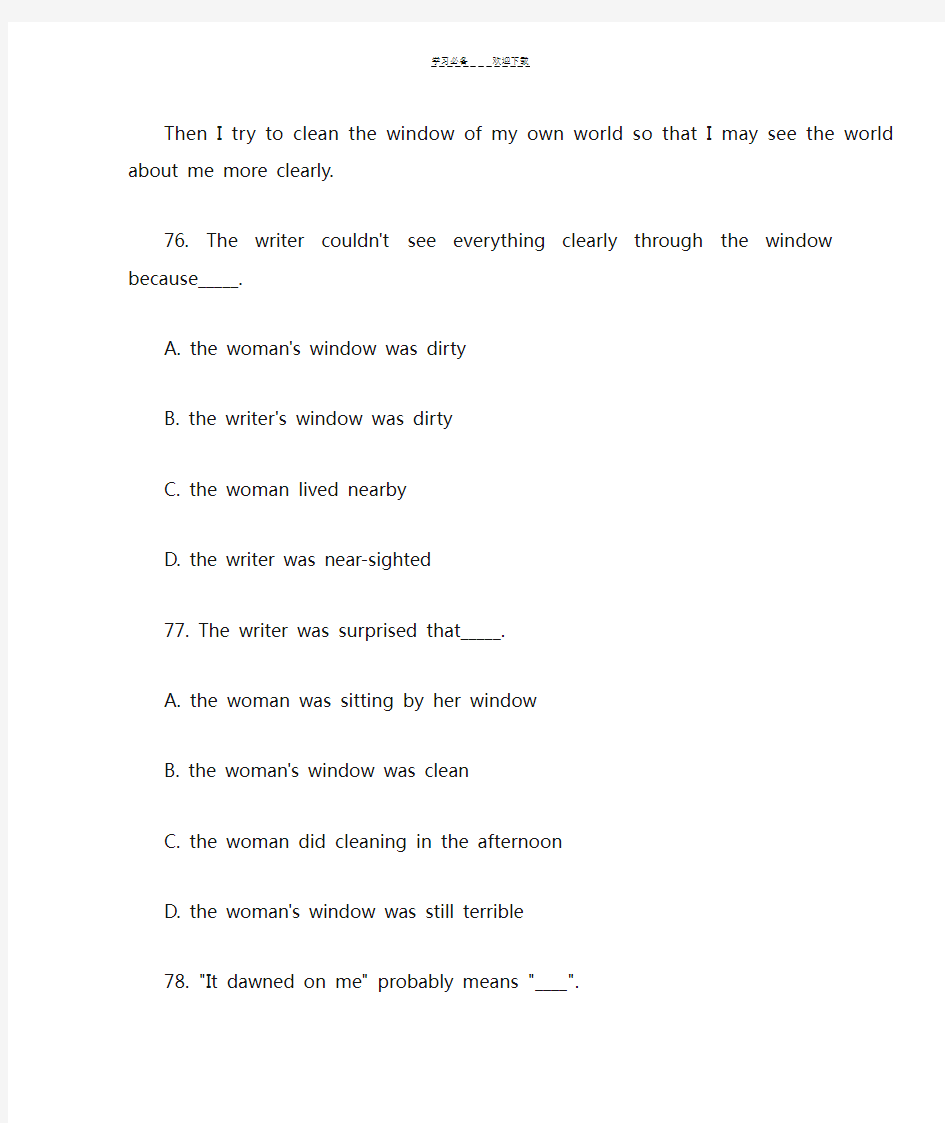牛津英语上海版-初二阅读理解练习


Years ago, I lived in a building in a large city. The building next door was only a few feet away from mine. There was a woman who lived there, whom I had never met, yet I could see her seated by her window each afternoon, sewing or reading.
After several months had gone by, I began to notice that her window was dirty. Everything was unclear through the dirty window. I would say to myself, "I wonder why that woman doesn't wash her window. It really looks terrible."
One bright morning I decided to clean my flat, including washing the window on the inside.
Late in the afternoon when I finished the cleaning, I sat down by the window with a cup of coffee for a rest. What a surprise! Across the way, the woman sitting by her window was clearly visible. Her window was clean!
Then it dawned on me. I had been criticizing (批评) her dirty window, but all the time I was watching hers through my own dirty window.
That was quite an important lesson for me. How often had I looked at and criticized others through the dirty window of my heart, through my own shortcomings?
Since then, whenever I wanted to judge (评判) someone, I asked myself first, "Am I looking at him through my own dirty window?"
Then I try to clean the window of my own world so that I may see the world about me more clearly.
76. The writer couldn't see everything clearly through the window because_____.
A. the woman's window was dirty
B. the writer's window was dirty
C. the woman lived nearby
D. the writer was near-sighted
77. The writer was surprised that_____.
A. the woman was sitting by her window
B. the woman's window was clean
C. the woman did cleaning in the afternoon
D. the woman's window was still terrible
78. "It dawned on me" probably means "____".
A. I began to understand it
B. it cheered me up
C. I knew it grew light
D. it began to get dark
79. It's clear that _____.
A. the writer had never met the woman before
B. the writer often washed the window
C. they both worked as cleaners
D. they lived in a small town
80. From the passage, we can learn ______.
A. one shouldn't criticize others very often
B. one should often make his windows clean
C. one must judge himself before he judges others
D. one must look at others through his dirty windows
Palaeontologists can tell much about how a dinosaur lived from the shape of its teeth or its beak, if it had no front teeth. Giraffes’teeth are different from zebras’teeth because giraffes eat tender leaves from the top of trees, white zebras eat tough, dry grass. In the same way, different families of dinosaurs evolved different kinds of teeth and beaks to cope with a variety of plants. Protoceratops, one of the smaller horned dinosaurs, had a parrot-like beak for shearing off plant stems, and scissor-like teeth to slice up its food.
Camarasaurus, an 18-m (59-ft) long sauropod, had spoon-like cutting but no grinding teeth. However, it could reach high into trees to tear away leave.
Corythosaurus, a duckbill, tore off leaves with its horny beak, stored them in its cheek pouches, then used rows of strong interlocking teeth to grind them.
Plateosaurus, an early, long-necked giant, had leaf-shaped teeth to pluck off the leaves of soft plants such as ferns. It did not have grinding teeth.
Iguanodon browsed on tough plants such as horsetails, and used its horny beak to nip off leaves. Its rows of ridged, grinding teeth crushed the leaves into a pulp.
STRANGE BUT TRUE
Heterodontosaurus, a plant eater from the early Jurassic Period had three kinds of teeth; on the lower jaw it had a horny beak. Then it had two pairs of large, fang-like teeth, with grinding teeth at the back.
33. A palaeontologist is a person who studies __________.
A. teeth
B. giraffes and zebras
C. animal eating habits
D. life in the distant past
35. The Heterodontosaurus is unusual because __________.
A. it had a beak and teeth
B. it had three kinds of teeth
C. lived in the early Jurassic Period
D. the beak was made of horny material
36. A dinosaur that did NOT have grinding teeth was the __________.
A. Heterdontosaurus
B. Plateosaurus
C. Corythosaurus
D. Iguanodon
37. One difference between the Corythosaurus and the Iguanodon was ____.
A. that Iguanodon could grind up its food
B. the way they took leaves from plants
C. that Corythosaurus had a beak
D. the Period in which they lived
38. From the study of teeth palaeontologists can tell __________.
A. how long each dinosaur lived
B. in which Period dinosaurs lived
C. the type of plants dinosaurs ate
D. when dinosaurs died out
Dear Sir,
I am writing to make a strong complaint about the impolite treatment my guests, my colleague and I received when we visited your restaurant last Friday evening.
On booking a table for four by telephone on Tuesday we were assured that there would be room for us despite the fact that your restaurant had been open only for a few weeks and all the tables had already been booked.
We appreciate that there must be great demand for restaurant meals at this time of the year in such a popular and historic area but we were not expecting such an ill-mannered reception on the part of your head waiter.
Our Chinese friends are currently touring the ‘Shakespeare Country’and were looking forward to a traditional English dinner in such a charming setting. But our hopes for an enjoyable evening out were instantly spoilt when your head waiter informed us that he had received no booking in our name and, so, no table was reserved for our party. My colleague and I protested at this and asked to speak to the Manager, who, we were told, was unavailable.
Your staff then offered us a table which we all had to share with another couple and no effort was made to smooth over the unpleasantness we had experienced. We also had to wait for some considerable time before the menu was brought to us.
I trust you will give this complaint your prompt attention as the whole embarrassing incident was a great disappointment to our guests and set a bad example to our English hospitality.
Yours sincerely,
Mr Paul J. Weller
42. Mr Weller could be described as being _______.
A. disappointed
B. impolite
C. moderately dissatisfied
D. hurt and angry
43. The writer had the unpleasant experience in _______.
A. a hotel
B. a Chinese restaurant
C. a restaurant in Shakespeare’s birthplace
D. a bar in London
44. Mr Weller hopes that this letter of complaint _______.
A. will be looked into at once
B. will embarrass the manager
C. will result in the restaurant being closed
D. will cause the quick dismissal of the head waiter
Happiness is for everyone. You don't need to care about those people who have beautiful houses with large gardens and swimming pools or those who have nice cars and a lot of money and so on. Why? Because those who have big houses may often feel lonely and those who have cars may want to walk on the country roads at their free time.
In fact, happiness is always around you if you put your heart into it. When you are in trouble at school, your friends will help you; when you study hard at your lessons, your parents are always taking good care of your life and your health; when you get success, your friends will say congratulations to you; when you do something worng, people around you will help you to correct it. And when you do something good to others, you will feel happy, too. All these are your happiness. If you notice them, you can see that happiness is always around you.
Happiness is not the same as money. It is a feeling of your heart. When you are poor, you can also say you are very happy, because you have something else that can't be bought with money. When you meet with difficulties, you can say loudly you are very happy, because you have more chances to challenge yourself. So you cannot always say you are poor and you have bad luck. As the saying goes, life is like a revolving(旋转) door. . When it closes, it also opens. If you take every chance you get, you can be a happy and lucky person.
91.Happiness is for_________ .
A. those who have large and beautiful houses
B. those who have cars
C. those who have a lot of money
D. all people
92. When you do something wrong, .
A. people around you will help you
B. you will have no chance to challenge yourself
C. your classmates will laugh at you
D. you will be happy
93. Which is true according to the passage? .
A. When you get success, your friends will be very proud of you.
B. You can get help from others when you make mistakes.
C. You can still be a happy person even if you have little money.
D. All the above.
94. Why do we say "Happiness is not the same as money"? Because .
A. money always brings happiness
B. money doesn't always bring happiness
C. everything can be bought with money
D. only rich people have happiness
95. Which is the title of the passage? ____________.
A. Happiness
B. Happy and Lucky
C. Do Something Good to Others
D. Life and Success
